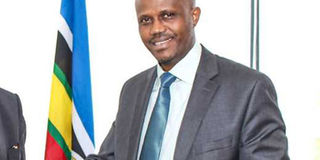Premium
The hurdles derailing East African Community take-off

The East African Community Secretary-General Libérat Mfumukeko. PHOTO | FILE
What you need to know:
- The EAC treaty requires a summit to take place at least once every year.
- It must also be attended by all heads of the partner states.
Nineteen years since it was formed, East African Community member states are pulling in different directions on various issues.
Libérat Mfumukeko, the EAC secretary-general and head of its secretariat, spoke about the gains made, the challenges the regional bloc faces and its blueprint for the next 20 years.
The heads of state summit didn’t take place as planned last year, the third time it was postponed. What went wrong?
The EAC treaty requires a summit to take place at least once every year. It must also be attended by all heads of the partner states. When we convene a meeting, the secretariat sets a tentative date after which we write to the chair of the summit.
The chair then consults his fellow presidents on their availability. They can delay a summit owing to other engagements.
An African Union meeting, for instance, would take precedence over an EAC summit. Ours is just to convene and to facilitate a summit.
What’s the position of the community on trade and border hostilities between Uganda and Rwanda?
We’re a community of six countries, with agreements and disagreements. We acknowledge that some countries don’t get along very well, which is regrettable. Getting all members to agree on all regulations is a long journey.
Conflicts may be of political or economic in nature, and some take longer to resolve. We can’t dictate to disputing countries on what to do. Countries generally address their own issues through bilateral talks. That said, the community intervenes using the established mechanisms. That’s all we can do.
In what ways is the community supporting its youngest member South Sudan?
When leaders of our member states admitted South Sudan to the community in 2016, they believed that having it in the EAC family would make it easier to support them. Already, South Sudan is benefiting from all our programmes, including peace and security, training, infrastructure, energy and production in agriculture.
We have recently secured a grant from the African Development Bank (ADB) to help South Sudan strengthen its banking sector. We had also given the country three years to join our customs union, to do favourable business with the rest of the region. As EAC, it’s our duty to defend their interests.
The Democratic Republic of Congo (DRC) has expressed interest in joining the bloc. What’s the progress of the admission?
EAC and the secretariat received the request from DRC through the chair of the summit, President Paul Kagame.
The matter will be on the agenda during the next summit. Member states will consider the request and follow the same procedures observed when Rwanda, Burundi and South Sudan were admitted. The feeling of our partner states on this issue is still unknown.
Different militia groups that have wreaked havoc in the region have often used DRC as their base. What’s the significance of DRC joining the bloc?
The interest of DRC to join the bloc is a win for the region. DRC is one of the richest countries in the world, with vast mineral deposits and good weather. It’s also a large market for goods and services. Regrettably, though, DRC isn’t a member of any community.
If they join EAC, they’d be coming with their vast territory, large market and natural resources.
DRC would be coming to the bloc with their troubles as well. As one of us, it’d be up to us to help them resolve their conflicts. Our peace and security programmes would apply to them.
To what extent do EAC leaders derail implementation of polices?
We are an institution of partner states that consults and refers to their leadership on every matter. If leaders don’t agree on guidelines drafted by the community, they’ll never implement them. If we agreed to remove taxes on all our imports, for instance, but one country failed to cooperate, our customs union protocol would never work. As a community, we can’t impose our decisions on any country.
Would you say that the trade environment in the region has improved following integration?
Goods move faster today from the port of Mombasa to other EAC countries because of improved infrastructure and our one-stop border posts. Our customs union and clearance functions have made access to other markets in the region easier, by eliminating visa fees and wastage of time.
Where would you say the community is failing?
The total land mass of EAC is about 2.5 million square kilometres. We have vast natural resources and human capital of more than 160 million people. Yet our combined GDP is about $150 billion. Belgium, which is roughly the size of Burundi, has a GDP of nearly $500 billion.
Netherlands, which is the size of Rwanda, has a GDP of more than $800 billion.
There’s no reason whatsoever why, 60 years after independence, we should be languishing in poverty as a region.





